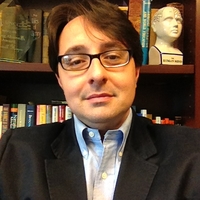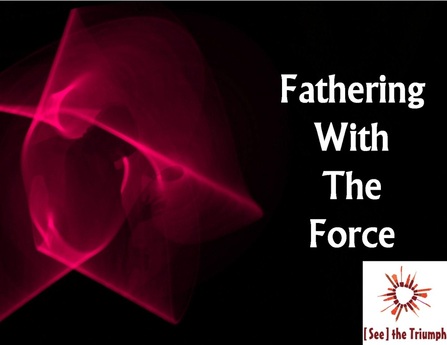|
5/18/2014 Fathering With The ForceBy Sherrill W. Hayes, Associate Professor and Director of the Master of Science in Conflict Management at Kennesaw State University See the Triumph Guest Blogger As a boy, I spent more time than I care to remember playing war and other violent games. I don’t know how I managed to squeeze in my homework among the lightsaber battles with shadow Darth Vader, shooting invisible Nazis from treetops, and bodyslamming pillow Andre The Giant. As I recall the amount of mental and physical energy I exerted in organizing my GI Joes in neat columns and planning the next epic rebel attack on the Death Star, I can only marvel at the other things I might have done. Now as a parent and a conflict management scholar, I find myself questioning my children’s exposure to they very things that fully occupied my time when I was a kid. No matter my actions, I feel I let myself down almost daily. I look around the house and see my children watching things and playing games that my inner social justice activist finds utterly inappropriate. My daughter watches shows that reinforce all the wrong gender stereotypes and constantly squabbles with the neighborhood girls in pre-cliqueish behaviors. My son has a blue plastic tub box that contains swords, archery sets, lightsabers, magic wands, and countless other implements of destruction. As I stand there in that moment, I tell myself “these things didn’t do me any harm”, then the news interrupts with an expose on cyberbullying and a breaking story of another campus lockdown. That is when I feel the need to shelter them from the horrors of this world. “The Force is…an energy field created by all living things. It surrounds us and penetrates us. It binds the galaxy together” The truth is that our jobs as parents cannot be considered through a snapshot of one moment. We are often our own worst critics, ignoring the good things we do and forgetting that we are not doing this job alone. Parenting is less about our actions and more about our interactions with our children, our co-parents, and the communities in which are children present. When we ignore these relationships, we forget that our children developing the skills they need to understand the complexities of the world from their experiences in these relationships. This is when I realize that I got more from Star Wars than lightsaber battles and a garage full of toys, I learned about The Force. “Fear leads to anger, anger to hate, and hate is the path to the Dark Side…” When Yoda is training Luke on Dagobah in “The Empire Strikes Back”, he sends him into “the cave”, where Luke must face his deepest fear. When Luke sees Darth Vader walking towards him he lashes out, beheading Vader in the process. The fallen mask then explodes and Luke sees his own face. A poignant, if violent, scene that teaches us that when we react to a situation with violence we often become the thing we fear the most. As a conflict management scholar, I know this is the nature of how disputes escalate and is the root of the most intractable forms of identity-based conflicts. It is also a scene that my son fully comprehended when he first saw it at 4 years old. My wife and I decided early on that rather than trying to directly shape our children into the people we wanted them to be through our own preferences and interests, we were better served by following their lead and look for the lessons that we can teach them in those interests. This means being observant, thoughtful parents who are prepared to talk to our children about violence they witness in ways that make sense to them. By acting as filters and guides to them rather than monitors and deprivers, we are better able to help them find their own balance. To be fair, my son asked to watch Star Wars because he loves his Dad and knows I love Star Wars, but watching it together has provided me many opportunities to see how he sees the world and help him. When do things together, he knows that I am also interested so we find opportunities to talk about the things that may be confusing, scary, or difficult. At 4 ½ my son explained to me the inner turmoil of Darth Vader as he threw Emperor Palpatine into the pit, which resulted in the ultimate reconciliation of a dying Anakin Skywalker with his son Luke at the end of “Return of the Jedi”. When I asked my son what he thought of this emotionally complex story line, all he said was, “He did it to save his son, because love is The Force Dad”. So the next day when we wanted to fight me with a lightsaber I knew that there was more to his war play than just the battle, I knew he understood “the true nature of the Force”. I have come to believe that building those relationships with and for my family are the most powerful weapons we have to prevent violence in our communities, just like Obi Wan and Yoda said they were. For more on parenting, war play, and Jedi conflict resolution, see… http://www.naeyc.org/files/tyc/file/Levin_1.pdf http://www.scholastic.com/parents/resources/article/parent-child/war-play-bad-kids http://www.ppu.org.uk/chidren/politics.html http://www.mediate.com/articles/hayesS2.cfm  Sherrill W. Hayes, Ph.D., is Associate Professor and Director of the Master of Science in Conflict Management at Kennesaw State University in suburban Atlanta, GA. In his career, Dr. Hayes has taught preschool, worked as a family and child custody mediator in the UK and US, designed and evaluated conflict resolution programs for governments and non-profits, and trained to a wide array of business, non-profit, and education professionals. He has published research, received grants, and taught university courses related to child development in cultural contexts, family and community conflict resolution, sports as a peacebuilding tool, and creating humanitarian space for refugee resettlement. He is a registered neutral in the State of Georgia, a member of the Association for Conflict Resolution (ACR) and the Association of Family and Conciliation Courts (AFCC). To read more of his work and connect with him go here: https://kennesaw.academia.edu/SherrillHayes Comments are closed.
|
Archives
July 2024
CategoriesAll About Intimate Partner Violence About Intimate Partner Violence Advocacy Ambassadors Children Churches College Campuses Cultural Issues Domestic Violence Awareness Month Financial Recovery How To Help A Friend Human Rights Human-rights Immigrants International Media Overcoming Past Abuse Overcoming-past-abuse Parenting Prevention Resources For Survivors Safe Relationships Following Abuse Schools Selfcare Self-care Sexual Assault Sexuality Social Justice Social-justice Stigma Supporting Survivors Survivor Quotes Survivor-quotes Survivor Stories Teen Dating Violence Trafficking Transformative-approaches |
Search by typing & pressing enter



 RSS Feed
RSS Feed